
Ellesmere Port is a port town in the Cheshire West and Chester borough in Cheshire, England. Ellesmere Port is on the south eastern edge of the Wirral Peninsula, 6 miles (9.7 km) north of Chester, 12 miles (19 km) south of Birkenhead, 16 miles (26 km) southwest of Runcorn and 11 miles (18 km) south of Liverpool. The town had a population of 61,090 in the 2011 census. Ellesmere Port also forms part of the wider Birkenhead urban area, which had a population of 325,264 in 2011.

Ellesmere Port and Neston was, from 1974 to 2009, a local government district with borough status in Cheshire, England. It covered the southern part of the Wirral Peninsula, namely that part which is not included in the Metropolitan Borough of Wirral.
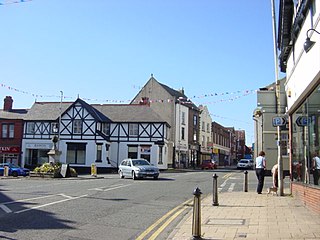
Neston is a market town and civil parish on the Wirral Peninsula, in Cheshire, England. It is part of the unitary authority of Cheshire West and Chester. The village of Parkgate is located to the north west and the villages of Little Neston and Ness Holt are to the south of Neston.
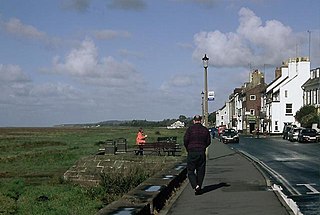
Parkgate is a village on the Wirral Peninsula in Cheshire, England, on the banks of the River Dee, adjoining 100 square kilometres (39 sq mi) of salt marsh. At the 2011 Census, it had a population of 3,591.

Thornton Hough is a village on the Wirral Peninsula, in Merseyside, England, of pre-Conquest origins. The village grew during the ownership of Joseph Hirst into a small model village and was later acquired by William Lever, founder of Lever Brothers, the predecessor of Unilever. Thornton Hough is roughly 10 miles (16 km) from Liverpool and 12 miles (19 km) from Chester. Administratively, it is part of the Clatterbridge Ward of the Metropolitan Borough of Wirral and is in the parliamentary constituency of Wirral South.

St Mary and St Helen Church is in the town of Neston, Cheshire, England. The church is recorded in the National Heritage List for England as a designated Grade II* listed building. It is an active Anglican parish church in the diocese of Chester, the archdeaconry of Chester and the deanery of Wirral South. Its benefice is combined with that of St Michael, Little Neston. St Thomas' Church, Parkgate, is a chapel of ease in the parish.
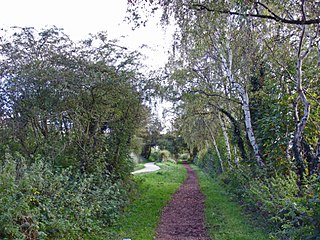
Neston South railway station was a station on the single track Hooton to West Kirby branch of the Birkenhead Railway, on the Wirral Peninsula, Cheshire, England. The station served the town of Neston.

St Thomas' Church is in School Lane, Parkgate, Cheshire, England. It is an Anglican chapel of ease in the parish of St Mary and St Helen, Neston, the deanery of Wirral South, the archdeaconry of Chester, and the diocese of Chester. The church is recorded in the National Heritage List for England as a designated Grade II listed building. Because of its earlier associations with the fishing community, it has been called the "Fisherman's Church".
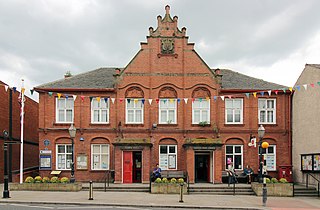
Neston Urban District was an urban district in Cheshire, England and previously known as Neston and Parkgate Urban District (1894-1933). It was the local authority for Neston and Parkgate, in the south-west of the Wirral Peninsula.

Macclesfield Town Hall is a Georgian municipal building in the Market Place of Macclesfield, Cheshire, England. Dating originally from 1823–24, it was designed by Francis Goodwin in the Greek Revival style, and extended in 1869–71 by James Stevens and again in 1991–92. The building incorporates the former Borough Police Station. The town hall is listed at grade II*.

Farnworth Town Hall is a municipal building in Market Street, Farnworth, Greater Manchester, England. The town hall, which was the headquarters of Farnworth Borough Council, is a grade II listed building.

Chadderton Town Hall is a municipal building on Middleton Road, Chadderton, Greater Manchester, England. The town hall, which was the headquarters of Chadderton Urban District Council, is a grade II listed building.
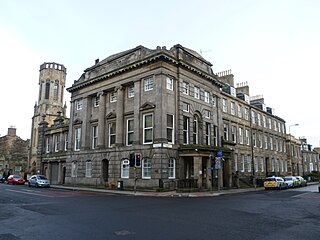
The Old Town Hall is a municipal building in Queen Charlotte Street, Leith, Scotland. The old town hall, which was the meeting place of Leith Burgh Council, is now used as a police station. It is a Category A listed building.

Stoke-on-Trent Town Hall is a municipal building in Glebe Street, Stoke-on-Trent, Staffordshire, England. The town hall, which is the meeting place of Stoke-on-Trent City Council, is a Grade II listed building.

Altrincham Town Hall is a municipal building in Market Street, Altrincham, Greater Manchester, England. The town hall was the headquarters of Altrincham Borough Council.

Warminster Town Hall is a former municipal building in the Market Place of Warminster, Wiltshire, England. The structure, which served as the headquarters of Warminster Urban District Council, is a Grade II listed building.

Corsham Town Hall is a municipal structure in the High Street, Corsham, Wiltshire, England. The structure, which serves as the meeting place of Corsham Town Council, is a Grade II listed building.

Wavertree Town Hall is a municipal building in the High Street, Wavertree, Merseyside, England. The structure, which was once the offices of Wavertree local board of health, is a Grade II listed building.

Horbury Town Hall is a former municipal building in Westfield Road, Horbury, West Yorkshire, England. The structure, which is now used as business centre, is a locally listed building.

The Old Town Hall is a building on Church Street in the market town of Poulton-le-Fylde in Lancashire, England. The building, which is located just beyond the northern end of Market Place, started life as a public house before becoming a municipal building and then reverting to use as a public house.





















